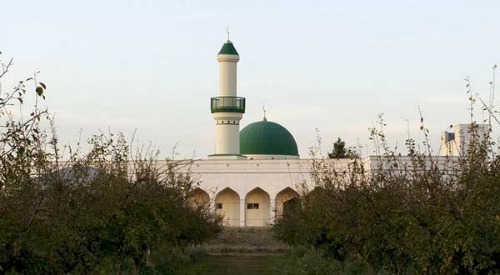"An American Mosque” Filmmaker aims for National Distribution on PBS

Over a century ago, farmers from South Asia migrated to the golden land of California. Yuba City, CA is a hub for several Muslim farming families who grow peaches, prunes and rice. Before the fire that destroyed the Joplin Masjid, MO and the fire that ravaged the masjid in Ohio, in 1994 the first masjid that was burned to the ground by bigotry was made by the descendants of these farmers.
As one drives through 99 corridor, the heavenly smell of fruit ladens the air. Here, Khalid Saeed’s family has owned a farm since 1956. He ripped up the peach trees and donated a 5 acre block of land in 1990s on Tierra Buena Road from the farm his grandfathers bought. “It’s all God’s land and He gave it to us, if we give him a part of it that not difficult at all,” says Saeed, a prosperous farmer who drives a tractor and speaks with a drawl typical of the area.
The masjid was built by the farm laborers, putting together 10s, 20s and 100s during Friday prayers to pay for the 1.8 million dollars in costs. Moving from a garage to this ambitious project, they constructed their million dollar masjid with their own hands. There were no outside donations, no foreign money- a truly American story. They sacrificed their own standards of living to build it.

The fire started after the night prayers and the worshipers left the masjid, the building was still under construction. The 12,000 sq ft building was destroyed within an hour and from the foundation to the twisted dome and minaret nothing could be reused. Although, the community feared the work of bigots, no arrests were made despite viable suspects and the crime was never solved.
The land is dedicated to the purpose and is considered sacred. They still wait for the person who committed to be caught. One of the investigators said that arson is easy to prove but hard to convict. In the wake of the fire, many questions were on the community’s mind. Who committed the crime? Is the arson an act of hate? How will the community respond and rebuild?
The culture clashed with a lot of people, says the former fire chief of the area Larry Johna, “because they were different”. Many in the community have held on to their traditions and culture. Around 500 Muslim families lived in the area in 1994 and felt safe in their ‘non public enemy’ personas.
David Washburn is an interfaith activist and award-winning filmmaker; he was recording oral history in Yuba City when he chanced upon the story of the charred masjid in a period of post 9/11 fearmongering. His own Jewish place of worship was burnt in Sacramento in 1999 and he is surprised at the amount of attention that incident received compared to the Yuba City masjid.
He decides to chronicle the story of the masjid in his documentary, An American Mosque. The title in intentional for the film that he researched, directed, edited and filmed. Upset over the negative portrayals of American Muslims after 9/11, he set out to make the movie with a help of a few supporters and grants. “Many Americans have a hard time pairing together Islam and being American, so many of these people view themselves as American as anyone else,” says Washburn.
Much of the funding for making the film came from surrounding area Muslim community members. Javed Siddiqui of JTS Engineering in Sacramento, the capital of California, drew the first civil engineering plans of the masjid. The clan that makes up the Siddiqui family supported the documentary as it is a part of the history of Californian Muslims. Dr. Sajad Janmohamed lives in Fair Oaks, CA. A lover of the arts and supporter of many community activities, he is also helped fund the film as did many others properous South Asian immigrants in his social circle who prayed with Khalid Saeed and other Yuba City Muslims when they would make the trek 45 minute up to the V street masjid in Downtown Sacramento for Eid in the 70s and 80s.
Stunning, beautiful cinematography which contrasts the pain and loss of the community is how Capital Public Radio describes this study of a hate crime. Despite their loss, Washburn says the film's central characters are unrelenting in their conviction that all Americans are entitled to a religious sanctuary and the right to practice their faith openly.
Washburn follows the Muslim farmers as they struggle to rebuild their local masjid. They regroup and peacefully respond to this devastating crime, while members of other faiths, especially their Sikh neighbors show their support. Many Christian neighbors cry as they reread the notes of sympathy that they wrote 20 years ago.
Abdul Hameed Bath, current president of the Islamic Center of Yuba City is shown in the film after the masjid is rebuilt, counting his blessings. In early 2000, the masjid bloomed once again nestled amongst the peach trees.
As masjid projects come under attack and hate-crimes against Muslims rise across the country, An American Mosque offers a cautionary tale showing the human consequence of this intolerance, says Washburn. He is often asked, "Why, as a non-Muslim, did you make An American Mosque?" His response is simple: Our country is greatest when Americans of all backgrounds speak out against injustice, work together in unity, and resist the "otherness" which creates division and fear. History shows this ethos fosters positive change in civil rights struggles, gender equality, and interfaith work. Shouldn't we all ask: "If not me, who? If not now, when?"
Washburn is looking to take this story national by bring it to over 300 PBS TV stations during the month of Ramadan. To support this effort please visit: http://www.indiegogo.com/projects/an-american-mosque-pbs-campaign









Comments powered by CComment